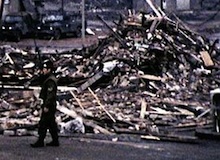 Patrick McGurk lost his mother and sister in the bomb that ripped
through his father’s bar in Belfast’s North Queen Street. On the 40th
anniversary of the bombing he spoke about his memories of December 4
1971 and how victims’ families are still continuing to fight for the
truth.
Patrick McGurk lost his mother and sister in the bomb that ripped
through his father’s bar in Belfast’s North Queen Street. On the 40th
anniversary of the bombing he spoke about his memories of December 4
1971 and how victims’ families are still continuing to fight for the
truth.
I was 12 years old at the time. I was the first person to escape from the wreckage of the bar. I had been taking a bath at the time and our bathroom was directly above the bar cellar, right at the back of the house.
It was the only part of the building that did not collapse so I was extremely lucky - I was the only survivor who wasn’t injured.
I remember pulling on my clothes in the darkness and then trying to get out down the stairway to the front of the house. That was completely blocked, so I had to climb out the window and clamber over the rubble to escape into Great Georges Street. My main memory of the wait for the ambulance centres on the fact that I knew that my mum and my 14-year-old sister, Maria, had gone to 7.30 Mass at St Patrick’s church.
I remember telling local women not to worry about the two of them - they were safe because they had gone to Mass.
I was constantly looking up North Queen Street, in the direction of Donegall Street, expecting them to arrive at any minute on this dreadful scene.
I didn’t discover until the next day that they must have arrived home only minutes be fore the bomb went off and that they had both died.
I have always thought it terribly poignant that they had both been praying in a place of God, just minutes before their lives were ended in such an evil fashion.
The next day was awful, such was the overwhelming sense of grief.
Despite my age, I was acutely aware of the enormity of my family’s loss - my mum, my sister and my uncle were dead. We had lost our home and my father had lost his business.
My dad and my older brother, Gerard, were still in hospital with their injuries, while my younger brother, John, and f were looked after by our grieving aunts.
Some friends of my aunts took us to the clothes shop they owned that Sunday, since we had literally nothing more than the clothes we stood in.
We were taken to see our father and brother in hospital later that Sunday and I recalled that two RUC detectives interviewed me.
They seemed to be particu arly interested in whether the windows in the bathroom had blown inwards or outwards.
I didn’t understand the significance of this at the time but I do recall telling them that there had been a lot of broken glass on the bathroom floor.
People always wonder how you cope with such a loss and such awful memories.
I have coped by locking the memories away in a box at the very back of my mind.
Perhaps that is not the best way but, by and large, it has worked over the last 40 years.
The main problem is that it locks away the happy memories of childhood - family holidays in Portrush, playing football in Great Georges Street - as well as the bad. But if you were to dwell on the bad memories every day you could not possibly have a remotely normal life.
The emotions are still, undoubtedly, raw at times when memories of that night are brought back to the surface.
The last 18 months have been difficult because we have been forced to relive the trauma of December 4 1971, caused by that shocking Police Ombudsman’s report of July 2010 and by the controversies which followed the revised report of February 2011.
When the ombudsman concluded what we had suspected all along was true that the RUC had been guilty of disgraceful bias and incompetence in their investigations in the we all felt vindicated. So, Matt Baggott’s immediate refusal to accept the main finding of “investigative bias” by the RUC, was sickening.
My first reaction was one of anger. I felt, how much evidence do we have to present to these people before they accept the truth? The UK government had already apologised for the misdeeds of the predecessors, so why on earth couldn’t the present chief of the Northern Ireland police? Incredible is not the word for it.
![[Irish Republican News]](https://republican-news.org/graphics/title_gifs/rn.gif)
![[Irish Republican News]](https://republican-news.org/graphics/title_gifs/harp.gif)

